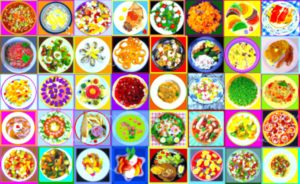 Last Tuesday, 23 of us sat around a sturdy conference table in the middle of our university classroom. It was my biweekly Advanced Writing for Media class, and the upcoming assignment: food memoir. Each student was to write a 1,000-word personal story about eating or cooking or something about food. Glorious food. Before the story writing was the storytelling.
Last Tuesday, 23 of us sat around a sturdy conference table in the middle of our university classroom. It was my biweekly Advanced Writing for Media class, and the upcoming assignment: food memoir. Each student was to write a 1,000-word personal story about eating or cooking or something about food. Glorious food. Before the story writing was the storytelling.
Luka said his grandfather looked like Stalin and owned a nameless tavern back in his home country of Georgia. It was there where Luka watched the generations of his family gather, share tales and eat khachapuri, a traditional dish of hot pastry filled with cheese. Nikoleta told us how as a girl she made cookies into characters who had personalities and adventures. An evening with a distant relative broke a language barrier for Momchil when he visited an unknown relative in Italy. As they cooked a meal together, Momchil found himself opening up in ways he hadn’t with his parents. A high school lunch quest for snail soup in Hanoi pushed Hoang to tear through his city’s streets illegally driving a motorbike. And more than one of my students spoke wistfully of learning to cook with a grandmother who was now gone or lost in the unreadable fog of Alzheimer’s disease.
As they told their stories, nostalgia and bittersweetness softened their voices. Loss and connection formed an undertow. Telling and listening opened us to one another.
Food was largely my mother’s domain as I was growing up. Sloppy Joes, spaghetti with ground beef, chicken cacciatore, chow mein, chicken a la king. Carb heavy, one-pot meals were the norm. Iceberg lettuce and Good Seasons salad dressing on the side. Vegetables more often than not came from cans.
Except for Sundays. On Sundays my father cooked. He occasionally took charge of burgers and steaks on our backyard grill, but his claim to cooking fame was pasty, a dish I knew was vaguely connected to our Irishness on his side of the family. Beyond that, all I knew was that pasty smelled really good and tasted even better. I also knew it seemed to make Dad happy as he puttered in the kitchen preparing it for our dinner.
On Sundays Dad spent the afternoon mixing the ingredients into a metal bowl as large as our kitchen sink. There were seven of us to feed, and Dad’s pasties were supersized versions of the classic pasty, which is most often an individual portion of pie crust pinched around an enthusiastic blob of diced meat and onion, and chunks of potato and rutabaga, a malicious turnip that prides itself on incapacitating vegetable peelers.
While the NFL Sunday lineup squawked from the television in our wood-paneled family room, Dad nipped into the kitchen, cutting sirloin steak into two-bite chunks and seasoning them with salt, pepper and briny Worcestershire sauce, the dadliest of all condiments. During halftime, the spuds were chopped, the pie crusts were rolled and the mixture was plopped into two large Pyrex pie plates. A crust draped across the bottom, and a crust covered the mound on the top. If I was lucky, he would let me pierce the dough with a steak knife to form escape hatches for the steam as the pasties baked. By late afternoon, the pies were slid into the oven for about 90 minutes.
When the pasties were ready, we slathered our portions with ketchup and gathered in the family room with our plates on our laps to watch “The Ed Sullivan Show” while we shoveled the meal into our mouths.
I think of my dear friend DeeDee who lights candles and adorns her dinner table with placemats and silver for each meal. Growing up, I learned food as fuel, meals as fueling stations. Food was best when it was plentiful and reliable. Its purpose was largely functional: to keep me growing and going. It wasn’t so much about savoring as it was about scarfing. Eat the food down and get onto the next thing.
It is only much later in life that I have learned the art, the theater and the deeper satisfactions of cooking, eating and sharing food. Craig Claiborne, a longtime food critic for The New York Times once said, “Cooking is at once child’s play and adult joy. And cooking done with care is an act of love.” Perhaps this is why Thanksgiving takes on such importance for so many of us. It celebrates cherished food groups of the body and spirit: food, love, joy and play.
This week another Thanksgiving comes around. And on this Thanksgiving I will not be gathering with loved ones around a table to share traditions and turkey. I will instead be far away, standing in a classroom with those same students who told their stories of loss and connection, of the past and the present, of their childhoods and the transom they are crossing into adulthood.
Their stories will feed me. And I shall be sated.

